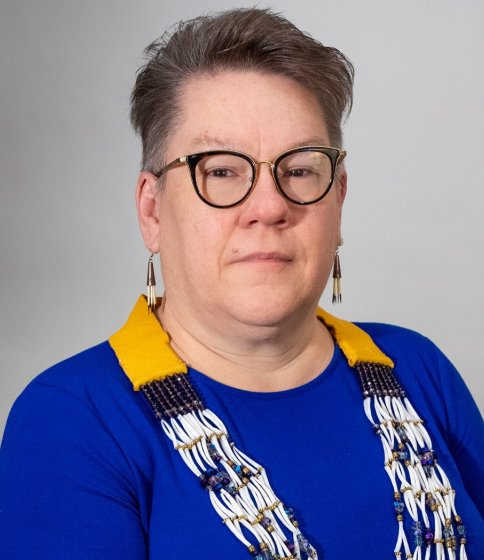
Claudette Grinnell-Davis
University of Oklahoma
Claudette Grinnell-Davis (she/they) is an assistant professor of social work in the Anne and Henry Zarrow School of Social Work at the University of Oklahoma, Tulsa Campus. Prior to coming to the University of Oklahoma, they were an assistant professor of social work in the Grace Abbott School of Social Work at the University of Nebraska at Omaha, where their working relationship with the Nebraska Indian Child Welfare Coalition led to an emerging research agenda in Indigenous child welfare and family preservation. They identify as Indigenous by culture, being descended from Anishinaabeg métis peoples of the Great Lakes.
Dr. Grinnell-Davis is trained as a social work scholar, a developmental psychopathologist, and a social identity theorist. As such, their research crosses many disciplinary boundaries in the quest to increase the knowledge base of Indigenous child and family well-being. Her most recent work is a study of state-level differences in American Indian/Alaska Native foster care practices between states which have state Indian Child Welfare Act statutes and states which do not, utilizing data from the Adoption and Foster Care Analysis and Reporting System (AFCARS) database. They have also presented to the Children’s Data Network at the University of Southern California on using typology analyses to identify the probability of ICWA compliance in AFCARS.
-
Children and FamiliesEvaluating the Impact of Nebraska’s Indian Child Welfare Act
In 1978, the Indian Child Welfare Act (ICWA) began the process of ameliorating centuries of prejudice, racism, and deliberate attempts to strip Indigenous peoples of their culture and heritage. The legislation created legal boundaries to protect Indian families and communities from the loss of their children.
July 14, 2023
|P4A Spark
| -
Children and FamiliesHonoring Indigenous Families: Evaluating the Impact of Nebraska's Indian Child Welfare Act
The removal and placement of Indian children away from their families and communities is a central component of historical trauma. Indian child welfare practice must contend with both the restoration of balance at the level of the individual the family and the community while negotiating with a system which has been an instrument of community disruption in the past.
September 15, 2021
|